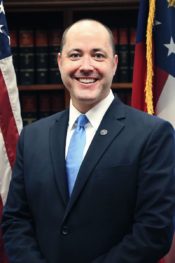The state’s attorney general has urged the Georgia Supreme Court to reverse a lower court opinion that barred access to Northside Hospital’s financial records.
Chris Carr, in office since late last year, said in a Monday court filing that the Georgia Open Records Act is broader in its applications than what Northside Hospital has argued.

The Supreme Court heard oral arguments last month in the high-profile case, which followed Northside’s rejection of requests for information about financial and other matters.
Attorneys for the plaintiff have argued that Northside is subject to the Open Records Act because it was created by a public hospital authority, which is a government entity, and that it operates solely on the authority’s behalf.
“The Office of the Attorney General has long served as a champion of open government,’’ Carr wrote in his brief. “The Attorney General — as a champion of open government, and as the state’s chief legal officer — urges the Court to honor the plain text of the Georgia Open Records Act, which embodies the state’s “strong public policy . . . in favor of open government.”
The outcome of the legal battle is being closely watched by the Georgia hospital industry because Northside’s corporate structure resembles many others in the state.
Many hospital authorities in Georgia, for business purposes, have spun off their hospitals into separate nonprofit corporations over the past three decades. Under such an arrangement, the hospital authority leases the assets of the hospital to the corporation.
Such restructured hospitals include large facilities such as Grady in Atlanta, along with medical centers in Savannah, Augusta, Macon, Rome and Albany, as well as in the Atlanta suburbs.
Northside has said it is not bound by the open records law. The hospital says that because it’s a private nonprofit corporation, not a public entity, the records law does not apply to it. An attorney for Northside, Randy Evans, told the state’s highest court last month that the system is a regional player, owning other hospitals in areas that are not governed by the hospital authority in Fulton County.

The Georgia Supreme Court asked for Carr’s opinion on the case after oral arguments were heard. A request by the court for an attorney general or an agency to weigh in on a case doesn’t happen a lot, but it’s not unheard of, said Jane Hansen, a spokeswoman for the court.
“And when it does happen, it usually involves a legal question posed to the agency responsible for enforcing the area of law in question,’’ Hansen said Tuesday.
“And it must be someone who’s not a party to the case. In this case, the attorney general is charged with enforcing the Open Records Act which is central to this case.”
Carr wrote that Northside’s interpretation of the Open Records Act – which the Court of Appeals accepted in its decision favoring Northside – is too narrow.
Carr wrote in his brief that “the Attorney General respectfully urges the Court to hold that the Georgia Open Records Act creates an implied contractual obligation that requires any private person or entity to produce any non-exempt record that it prepared, maintained, or received in the performance of a service or function for or on behalf of an agency. In addition, because the Court of Appeals did not apply that rule, the Attorney General respectfully urges the Court to reverse and remand with instructions that it do so.”

Still, a Northside official said Tuesday that the hospital is confident of ultimately prevailing in the case.
“The amicus brief of the attorney general has suggested a reading of the Open Records Act which has not been urged by either party, by the trial court, or by the Court of Appeals,’’ said Lee Echols, vice president of marketing for Northside.
“We do not agree with the attorney general’s conclusions. Northside Hospital won the case in the trial court, won again in the Court of Appeals, and we are confident that the Supreme Court will uphold the decisions of the lower courts.”
Carr, formerly the state’s economic development commissioner, took office as Georgia attorney general last Nov. 1 under an appointment by Gov. Nathan Deal. The office had become vacant when Sam Olens, the elected attorney general, resigned to become president of Kennesaw State University in his home county of Cobb.
A pivotal issue for many
The fight over Northside’s records and hospital privacy began in 2013, when attorney E. Kendrick Smith requested information about Northside’s expenditures in the acquisitions of physicians’ practices. The AJC that year reported about patients who faced higher bills after the acquisition of two of these practices.

The hospital turned down the request. The plaintiff, a partner of the firm Jones Day, filed suit, and the case was first heard in Fulton County Superior Court.
The judge ruled in favor of Northside, saying that the hospital authority had nothing to do with the operations and acquisitions of the hospital.
Smith appealed. The court of appeals, in a split decision, upheld the lower court ruling.
Media outlets, which make frequent use of open records requests to investigate and report stories, traditionally favor broad access. The Georgia Press Association, the First Amendment Foundation, the Savannah Morning News and the AJC are among organizations that have filed amicus briefs supporting the Smith appeal.
The Georgia Chamber of Commerce, among other organizations, has sided with Northside.
Here’s the AJC’s Carrie Teegardin’s report on the Carr brief.

